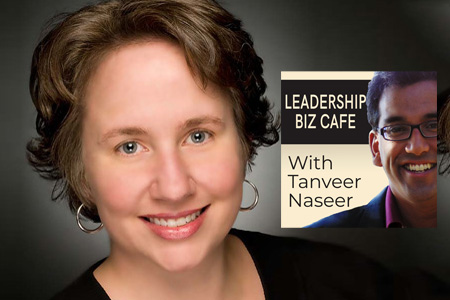A common theme found among the numerous books and articles on successful leadership is that leaders need to be more open, more transparent with those they lead in order to improve communication channels and drive forward initiatives that are key to an organization’s success and growth.
But what if we’re not as open or as easy to read as we might think that we are? What if the actions we’re taking overlook a key aspect of how our brain operates?
That’s the premise and focus of this new episode of my leadership show, “Leadership Biz Cafe” where I welcome Dr. Heidi Grant Halvorson to share her insights from her latest book “No One Understands You And What To Do About It”.
Heidi is a social psychologist whose research and writings focus on the science of motivation. She is also the Associate Director of the Motivation Science Center at Columbia Business School and a member of many esteemed scientific communities and organizations. In addition to authoring several books including “Succeed: How We Can Reach Our Goals” and “Focus”, Heidi is a frequent contributor to the Harvard Business Review, Fast Company, The Wall Street Journal, and Psychology Today.
You may also recognize her name from some of the guest contributions she’s made to my leadership blog as well.
Over the course of our conversation, Heidi and I discuss a number of interesting points and insights from various studies shared in her latest book that can help leaders become more effective in their roles, including:
- Why we’re not as well understood as we might think we are, despite our efforts to be more open and more transparent in our leadership.
- What drives the assumptions we all make about the people we lead and serve, and how stereotyping is only the tip of this sub-conscious iceberg.
- How our unconscious biases lead us to see creativity as something negative for effective leadership, where the more we see someone as being creative, the less we see them being an effective leader for our organization.
- Why we’re not as good at picking up the context behind most of our interactions because of how our brain processes information and what we can do about it.
- How even our circadian rhythms – the things that make one leader a “morning person” and another a “night owl” can dramatically impact how we perceive people and situations.
- How power affects the way leaders view or understand the realities those around them face and what they can do about it to be more effective in their leadership.
- A powerful question every leader should be asking those in their trusted circle to help them better understand how they are really coming across to those they lead.
It’s a fascinating conversation and there was certainly more I would’ve liked to discuss with Heidi in this show to help listeners better understand how we perceive others and how others perceive us, and the impact this has on our ability to successfully lead those under our care.
I encourage you to check this episode out as there’s so much to learn and benefit from in terms of how you approach your leadership and the conversations you have with your employees.
As I mentioned at the end of this episode, I’d love to hear what you think about this episode, as well as what other topics you’d be interested in hearing more about in upcoming episodes of my show. Please share your thoughts and ideas by leaving a comment below or by filling out the contact form on my website.
I’d appreciate it if you could help support future episodes of this leadership podcast by taking a moment to rate my show on Apple Podcasts, Google Podcasts, or your preferred streaming platform.
Noteworthy links:
- Buy Heidi Grant Halvorson’s book “No One Understands You And What To Do About It” on Amazon.com (or Amazon.ca for Canadian readers).
- Learn more about Heidi’s work and her writings at heidigranthalvorson.com.


Tanveer
This is an excellent question, whether one is a leader or not.
“How they are really coming across to those they lead.”
Thank you for hosting Heidi and her brilliant insights.
We all can choose how to respond at any given situation – the higher road is often a stretch – and well worth the effort.
Cheers MicheleElys
It's my pleasure, MicheleElys. Heidi and I had a great time discussing some of the research she shared in her book. While there is so much more that I would've loved to brought up in my interview to share with my listeners, I know there's some incredibly valuable insights in this show that can really help leaders do a better job guiding their employees and organization forward.